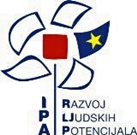 Strategically speaking, tourism is an extremely important factor of the European economy because it amounts for 11 % of its GDP. The sector employs about 12% of the overall European workforce (24 million people). The Croatian Tourism Development Strategy 2020 defines the key constraints of development until 2020, with human resources and quality management (formal education, lifelong learning, and tourism awareness) being highlighted.
Strategically speaking, tourism is an extremely important factor of the European economy because it amounts for 11 % of its GDP. The sector employs about 12% of the overall European workforce (24 million people). The Croatian Tourism Development Strategy 2020 defines the key constraints of development until 2020, with human resources and quality management (formal education, lifelong learning, and tourism awareness) being highlighted.
Tourism faces new challenges that require higher ICT digital competences that offer huge potential for further tourism development, along with other sectors. Both the EU and other developed countries in the world have acknowledged tourism, entrepreneurship, education, and new technologies as groundbreaking factors when it comes to advancing entrepreneurial ideas, and setting standards which support entrepreneurial learning at the national level. The new technologies outline the use of business simulation games and their incorporation into the curricula of vocational schools. Studies carried out recently have pointed to the fact that ICT skills should be improved, requiring stronger ties between the practical and theoretical knowledge. This in turn resulted in the IPA project - Human Resources Development – Modernization of school curricula in VET schools in line with the changing needs of the labour market / economy. The project was titled Competitive Youth.
The value of the grant contract was 167.933,80 €, with the Hotel and Tourism Industry School Opatija being the beneficiary, and Private School and Economic School Katarina Zrinski being the partner. The latter provided support in the field of entrepreneurship. Cesim Ltd., a Finland-based company, also took an active part in the project as the cooperator for presenting, instructing, and implementing Cesim Hospitality simulation game. The restaurant and hotel simulation game provides users (students) with the opportunity of a virtual hotel management, taking into consideration new technologies and learning styles. The Agency for Vocational Training and Adult Education (also the contracting authority) recognized the value of the project, as well. The main objective of the project is to improve the students' digital and entrepreneurial competences. The Ministry of Education, Science and Sports, as well as the Education and Teacher Training Agency will be able to use that knowledge and modify the curricula by modernizing them in accordance with the European Qualification Framework. Other parties that will also enjoy the benefits of this project are the employers and Primorje-Gorski kotar County, primarily because of the students' newly acquired skills which will satisfy the labor market needs, thus enabling easier employment and decreasing unemployment. By taking part in this project, students have gained skills in developing their competitiveness, and team work, qualities that define a successful manager.
 Within the project students have taken part in the Cesim Hospitality hotel and restaurant simulation game competition on the national level. The competition was named Piece of Cake, and it included students from five Croatian schools:
Within the project students have taken part in the Cesim Hospitality hotel and restaurant simulation game competition on the national level. The competition was named Piece of Cake, and it included students from five Croatian schools:
- Grammar School and Economic School Katarina Zrinski, Zagreb
- Business School Varaždin
- Vocational School Virovitica
- Secondary School “Vladimir Gortan” Buje
- Hotel and Tourism Industry School Opatija
Students were surveyed on their digital and entrepreneurial competences before and after the competition. They gained knowledge in company management, and acquired digital and entrepreneurial skills essential for starting their own enterprise (a private hotel/ restaurant or a motel). The instruction on how to use the business games started on March 15th, while the competition lasted till June 7th 2013.
The business strategy games gave students not only the insight into a whole range of products, but also the chance to analyze the online offer, monitor the trends of potential clients (market research), as well as the development trends of competitive products. They were able to monitor the offer changes of the services provider, accommodation capacity, take care of the equipment, and manage the booking via distribution channels. Moreover, they recorded and monitored the prices of the already booked capacities, took care of the occupancy, created and offered a range of products which might satisfy the guests’ desires. Last but not least, they took part in ensuring the quality of the service is high, and that the engagement level of the teams and their own are satisfactory.
The finalizing of this project has established strong connections between educational institutions and the business sector – students have gained skills that are in line with requests on the labor market. All the students who took part in the competition will be awarded a Cesim Ltd. certificate for successfully completing the Hospitality Business Simulations course, while the schools will get a 350 000 Kuna worth IT equipment.
The project was evaluated by the following institutions:
- Regional Development Agency PORIN
- Croatian Chamber of Economy – Rijeka Branch
- Opatija Tourist Board
- Croatian Employment Service – Rijeka Branch
 |
 |
 |
 |



